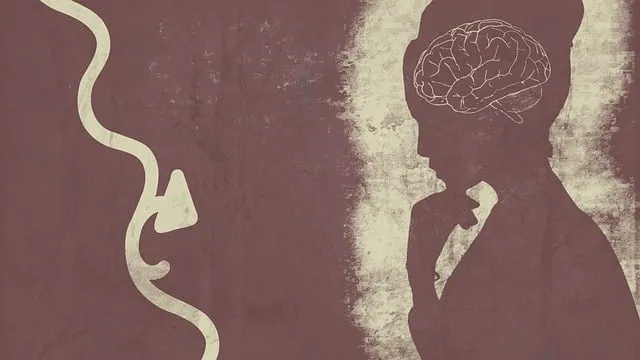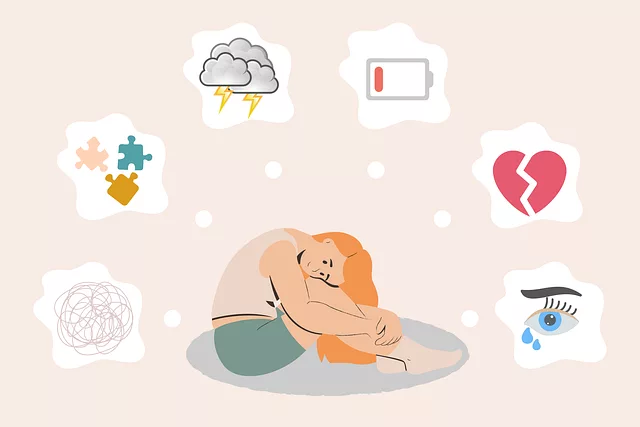Emotional Intelligence (EI) is a powerful driver of personal and professional growth, especially in challenging settings like Castle Rock's inpatient mental health facilities. EI enhances crisis intervention through self-awareness exercises, mindfulness, and empathy training, fostering a supportive therapeutic environment. Public awareness campaigns also play a vital role in reducing mental health stigma. At Kaiser in Castle Rock, the Community Outreach Program emphasizes mental wellness through initiatives like Mental Wellness Journaling Exercises, helping individuals identify triggers, promote anxiety relief, and build resilience. Developing empathy through mindfulness meditation is key to enhancing EI, fostering meaningful relationships, conflict resolution, and depression prevention. Managing emotions, akin to taming a 'Castle Rock' within, is crucial for emotional intelligence development, leading to improved emotional healing and clarity in response to challenges.
Emotional intelligence (EI) is a powerful tool for personal growth and effective communication. In this article, we explore the art of cultivating EI, drawing inspiration from the metaphorical journey within ourselves to discover our inner Kaiser. We’ll delve into four key aspects: understanding EI’s fundamentals, fostering awareness, developing empathy, and mastering emotion regulation. By navigating these sections, readers will uncover strategies to enhance their emotional intelligence, mirroring the resilience of a fortress amidst the ever-changing landscape of mental health, much like the iconic Castle Rock does for the Kaiser within.
- Understanding Emotional Intelligence: Unlocking the Kaiser Within
- The Role of Awareness in Building Emotional Intelligence
- Developing Empathy: Expanding Your Emotional Horizon
- Managing and Regulating Emotions: Taming the Inner Castle Rock
Understanding Emotional Intelligence: Unlocking the Kaiser Within

Emotional intelligence (EI) is a crucial aspect of personal and professional growth that allows individuals to understand and manage their own emotions, as well as recognize and empathize with others’ emotional states. Often referred to as “the Kaiser within,” EI involves self-awareness, self-management, social awareness, and relationship management skills. For those seeking to enhance their emotional intelligence, especially in challenging situations like inpatient mental health settings at Castle Rock, Self-Awareness Exercises can be a powerful tool. These exercises help individuals recognize triggers, understand their emotional responses, and develop strategies to maintain calm and composure under pressure.
In the context of healthcare, particularly within crisis intervention guidance, fostering high levels of EI is vital. Public Awareness Campaigns Development can play a significant role in promoting understanding and reducing stigma around mental health issues, thereby encouraging individuals to seek help early. By integrating emotional intelligence-based practices, such as mindfulness and empathy training, Castle Rock’s inpatient mental health facilities can create a more supportive and therapeutic environment for patients, enabling them to unlock their inner strength and work towards healing.
The Role of Awareness in Building Emotional Intelligence

Emotional intelligence building starts with awareness—a fundamental pillar that forms the crux of understanding one’s own emotions and those of others. This initial step, often referred to as emotional awareness, is akin to navigating a labyrinthine mind, where every twist and turn reveals new insights. By cultivating this awareness, individuals can begin to decipher the subtle cues and signs that their emotions convey, much like deciphering whispers from a distant land.
At Kaiser, located in Castle Rock, our Community Outreach Program Implementation includes initiatives focused on mental wellness. We encourage people to explore Mental Wellness Journaling Exercises as a guidance tool for enhancing self-awareness. By documenting thoughts and feelings, one can identify patterns and triggers that contribute to anxiety relief. This proactive approach not only empowers individuals but also fosters a sense of calm and clarity, enabling them to navigate life’s challenges with greater resilience and emotional intelligence.
Developing Empathy: Expanding Your Emotional Horizon

Developing Empathy: Expanding Your Emotional Horizon
In the world of emotional intelligence, empathy stands as a cornerstone, enabling individuals to understand and connect with others’ feelings. At Kaiser’s inpatient mental health facility in Castle Rock, experts emphasize that cultivating empathy isn’t just about feeling what someone else feels; it’s about recognizing, interpreting, and responding appropriately to their emotions. This skill is crucial for fostering meaningful relationships, resolving conflicts, and promoting depression prevention.
By practicing mindfulness meditation, individuals can enhance their emotional intelligence. Mindfulness encourages individuals to become more attuned to their own emotions and, by extension, those of others. This heightened awareness fosters a deeper understanding of human experiences, nurturing empathy that transcends cultural and personal boundaries. Ultimately, it’s a journey toward becoming more empathetic—a game-changer in navigating the complex landscape of human interactions.
Managing and Regulating Emotions: Taming the Inner Castle Rock

Managing emotions is a vital part of emotional intelligence development, and it often feels like taming a Castle Rock within us. Just as a majestic fortress stands strong against external attacks, our inner castle holds our emotions, some welcoming guests and others seen as intruders. The challenge lies in understanding that all emotions are valid, but learning to regulate them is key. This process involves recognizing when our feelings are taking center stage and implementing strategies to keep them in check, ensuring we don’t let them dictate our actions or reactions.
Emotional healing processes can be enhanced by this self-regulation skill, which also plays a significant role in depression prevention. By managing our inner castle, we gain control over our emotional responses, fostering a sense of calm and clarity. This is where the concept of Kaiser’s inpatient mental health services comes into play—it offers specialized care for those needing guidance in navigating these complex emotions. Through therapy and support, individuals can learn to transform their relationship with their ‘Castle Rock,’ allowing them to respond rather than react, thus improving overall emotional intelligence.
Emotional intelligence, a powerful tool for personal growth, can be cultivated through awareness, empathy, and emotional regulation. By understanding and managing our own emotions, we can better navigate relationships and connect with others, especially those facing challenges like those requiring inpatient mental health care at Castle Rock or similar facilities. Embracing these strategies enables us to unlock our inner Kaiser, fostering a more balanced and compassionate self.






